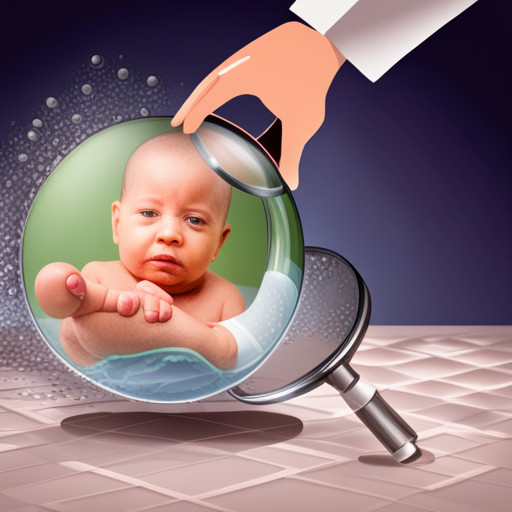Navigating Neonatal Health Challenges: A Perspective on Toxic Water Exposure
This article critically examines the considerable risks posed by toxic water exposure on neonatal health.

It provides a comprehensive overview of current understanding, investigates real-life case studies, and proposes mitigation strategies to reduce these hazards.
The discussion concludes with future directions aimed at enhancing water safety measures for newborn health and wellbeing.
Key Takeaways
- Genetic predispositions, maternal health during gestation, adequate prenatal care, and exposure to polluted water are all factors that can affect neonatal health.
- Neonatal nutrition plays a crucial role in newborn immunity development, digestive function, healthy weight gain, and the foundations for immune system maturation, emphasizing the importance of breastfeeding.
- Toxic water can have a significant impact on newborn health, including threats to the underdeveloped immune system and disruptions in gut microbiota development. Strategies for reducing infant exposure and promoting safe water practices are essential.
- Real-life examples of water contamination in places like Flint, Michigan, and rural areas of Bangladesh highlight the importance of legislation changes, both reactive and proactive approaches, and strict regulatory control over industries.
Understanding Neonatal Health: An Overview

Understanding neonatal health necessitates an in-depth examination of various factors, including genetic predispositions, maternal health, prenatal care, and environmental influences such as toxic water exposure. The importance of neonatal nutrition cannot be understated as it plays a significant role in newborn immunity development.
From the lens of genetics, certain hereditary conditions can exacerbate or mitigate neonatal health outcomes. Maternal health is equally critical; studies suggest that the mother's physical and psychological state during gestation profoundly impacts the offspring's physiological development.
Prenatal care - encompassing adequate nutrition, regular medical check-ups and abstinence from harmful substances - is paramount for optimal neonatal growth. It aids in early detection of potential complications, facilitating timely interventions to improve birth outcomes.
While these factors are within human control to varying degrees, some external elements such as exposure to polluted water are less so. Toxic water exposure may lead to devastating consequences on neonates' wellbeing. Contaminants like heavy metals can impede brain development while microbial pathogens can cause life-threatening gastroenteric infections.
Emphasizing Neonatal Nutrition Importance further highlights how essential nutritional intake during the first days after birth helps establish robust digestive function and supports healthy weight gain. It also lays foundations for immune system maturation. Adequate consumption of mother's milk rich in immunoglobulins promotes Newborn Immunity Development by providing passive immunity against common pathogens until the baby's own immune system matures.
The Impact of Toxic Water on Newborn Health

The detrimental effects of contaminated liquid on the wellbeing of newly born infants represent a significant concern in the field of pediatric care. Waterborne diseases, such as diarrhea, cholera, and typhoid, among others, pose considerable threats to this vulnerable population due to their underdeveloped immune system.
Scientific research has established that neonatal immunity is qualitatively different from adult immunity; it is less equipped to handle environmental pathogens due to its immaturity at birth. The susceptibility of infants to waterborne diseases can be exacerbated by poor hygiene practices and unsafe drinking water sources.
Waterborne pathogens may also disrupt gut microbiota's development in newborns - an integral part of neonatal immunity development. Disruptions can lead to long-term health complications including malnutrition, stunted growth and cognitive impairment.
From a clinical perspective, healthcare providers need effective strategies for reducing infant exposure to contaminated water and mitigating its impacts. This includes promoting safe water practices during pregnancy and postpartum periods - crucial times for shaping a newborn's microbial environment.
Moreover, early intervention programs focusing on immunization against common waterborne diseases could strengthen neonatal immunity. This approach could lessen disease prevalence within this susceptible group while improving overall infant survival rates.
Lastly, encouraging breastfeeding can further bolster neonatal immunity because breast milk contains antibodies that protect against various infections until an infant develops its own immune defense mechanism.
Case Studies: Real-life Impacts of Water Contamination on Neonatal Health

Several instances from around the globe provide a stark illustration of the devastating effects that contaminated liquid can have on newly born infants. Contamination sources vary widely but commonly include industrial waste, agricultural runoff, and outdated infrastructure. This tainted water leads to numerous health adversities for neonates, including gastrointestinal diseases, impaired growth, and cognitive development deficits.
In 2014-2015 in Flint, Michigan (USA), outdated water systems led to lead contamination of drinking water. Resulting health repercussions amongst newborns included an increased rate of fetal death and lowered fertility rates. In Bangladesh's rural areas, arsenic-contaminated groundwater has been associated with infant mortality increases due to acute lower respiratory infections linked with in utero exposure.
These cases highlight how unchecked contamination sources can inflict catastrophic impacts on neonatal health. However, they also underscore the potential for legislation changes as powerful tools towards ameliorating these issues. For instance, after the Flint crisis unfolded publicly, significant policy revisions were made regarding public water system regulations in many U.S jurisdictions.
In contrast to this reactive approach adopted by countries like the U.S., others proactively incorporate preventative measures into their legislative framework. Sweden provides an example where strict regulatory control over industries has led to considerably less toxic chemical release into aquatic environments thereby protecting vulnerable populations such as newborns from harmful exposure.
These case studies underline that comprehensive understanding of contamination sources coupled with effective legislation changes can indeed play pivotal roles in safeguarding neonatal health against toxic water exposure.
Strategies for Mitigating the Risks of Toxic Water Exposure

Mitigation strategies for reducing the risk associated with contaminated liquid resources must be robust, multifaceted and include both reactive and proactive measures to be truly effective. A key component of these strategies includes implementing innovative water filtration methods at a local level. These techniques can range from basic sieve-like filters to advanced biological or chemical processes. The choice of filtration method is often determined by the type of contaminants present in the water source, as well as financial and logistic constraints.
Community awareness programs play an equally significant role in mitigating risks associated with toxic water exposure. They serve to educate the public about the potential hazards linked with contaminated water consumption, and promote safe practices such as boiling or filtering drinking water when necessary. In addition to raising awareness, these programs also devise problem-solving scenarios that empower communities to identify their own solutions for obtaining clean, safe water – thereby fostering resilience against future contamination threats.
Furthermore, regular assessment and monitoring of liquid resources are critical components of mitigation strategies. This involves comprehensive testing of community water sources for a myriad array of potential contaminants - from heavy metals to microbial pathogens. The data gathered through this process serves not only to inform appropriate remediation tactics but also helps shape policy decisions regarding safe waste disposal practices and industrial effluent management.
Future Directions: Improving Water Safety for Newborn Health

Future directions in ensuring safety of liquid resources for newborns involve refining and expanding the aforementioned strategies, with a particular focus on technological advancements in filtration methods, wider reach of community education programs, and stricter enforcement of environmental regulations.
The development of innovative water filtration advancements is crucial to this endeavor. Modern techniques such as reverse osmosis and nanofiltration are promising; however, they necessitate further research and development to increase their efficiency and accessibility.
Ensuring effective newborn hygiene practices fundamentally relies on the availability of safe water resources. It therefore becomes essential that communities are educated about these prerequisites. Facilitation of widespread knowledge dissemination can be achieved through educational initiatives targeted towards new parents or caregivers. This would involve teaching them about harmful contaminants present in water supplies, their potential impacts on neonatal health, how to identify unsafe water sources and use advanced filtration systems effectively.
Enforcement of stringent environmental regulations plays a significant role in maintaining the purity of liquid resources. Regulatory bodies need to adopt proactive monitoring measures for early detection of contamination events. Subsequently, reactive strategies should be implemented promptly to mitigate potential threats posed by contaminated liquid resources.
Frequently Asked Questions
How Can Parents Identify Signs of Water Toxicity in Their Newborns?
Symptoms recognition in neonates exposed to toxic water may include unexplained illnesses, changes in behaviour, or developmental delays. Treatment options typically involve immediate cessation of exposure and comprehensive medical intervention to mitigate potential long-term effects.
Are There Any Specific Regions or Communities That Are at a Higher Risk of Toxic Water Exposure?
Regions with inadequate sanitation facilities, industrial contamination, and impoverished communities are at a heightened risk of toxic water exposure. Preventive measures and community initiatives can significantly mitigate these risks by ensuring clean water access.
Can Toxic Water Exposure Impact the Cognitive Development of Newborns?
Research indicates that toxic water exposure can indeed affect cognitive development in neonates. Preventive measures should be taken to limit prenatal exposure, as it may lead to long-term neurodevelopmental disorders and cognitive impairment.
Is There Any Ongoing Research Into New Methods of Detecting Water Toxicity?
Ongoing research indeed focuses on developing innovative detection techniques as part of toxicity prevention strategies, aiming to identify harmful substances in water more accurately and rapidly, thereby reducing potential health risks.
What Are Some of the Long-Term Health Effects That a Newborn May Experience as a Result of Toxic Water Exposure?
Long-term health effects of toxic water exposure in neonates may include developmental disorders, cognitive impairments and physical abnormalities, as documented in Prenatal Exposure Effects and Birth Defects studies.
Conclusion
In conclusion, the adverse effects of toxic water exposure on neonatal health necessitate urgent intervention. Rigorous research and policy changes could mitigate these risks.
The development and implementation of effective strategies for ensuring water safety are paramount in safeguarding newborn health.
This discussion underscores the critical need to address environmental factors influencing neonatal health outcomes, emphasizing the importance of clean, safe water provision as an essential component of comprehensive neonatal healthcare.

This post has been generated by AI and was not reviewed by editors. This is Not legal advice. Please consult with an attorney.




